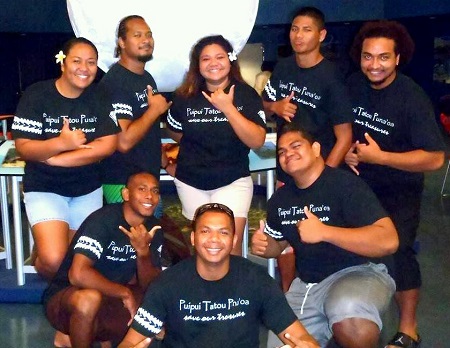
Former ASCC students who interned at the National Marine Sanctuary of American Samoa this summer include: (top left to right) Natosha Ripley, Junior Rex Lokeni, Leilua Willis Watson, high school intern, Oliver Mortenson; (bottom left to right) high school intern, Charles Miller, and Iosefa Siatuu. (Courtesy Photo)

Former ASCC students who interned at the National Marine Sanctuary of American Samoa this summer include: (top left to right) Natosha Ripley, Junior Rex Lokeni, Leilua Willis Watson, high school intern, Oliver Mortenson; (bottom left to right) high school intern, Charles Miller, and Iosefa Siatuu. (Courtesy Photo)
Former ASCC MSP Students Continue Research, Community Service
August 25, 2014
By Kelley Anderson Tagarino
Students often wonder where their chosen paths will take them after their time at the American Samoa Community College (ASCC). With so many options available to them today, the possible pathways are endless, and these choices can feel overwhelming. Several former ASCC students returned home for the summer, each of them currently pursuing a Bachelors or Masters degrees in Marine Science at the University of Hawai‘i at Hilo (UHH), and they shared the positive experiences that have resulted from their choice to enter the field of Marine Science.
June Fuifatu graduated from ASCC in 2011 with an AA in Liberal Arts, and transferred to UHH in 2012. She interned this summer at the American Samoa Power Authority Archeology Lab, an opportunity funded through the Highly Engaged Learning Program. “I got interested in Marine Science when I took a Special Project class and conducted research on coral reefs,” she recalled. June subsequently applied this knowledge to historic artifacts such as fishhooks, fish traps, and fish bones, which was her introduction to Maritime Archeology, a field that UH offers several courses in. “My educational goal is to get my BA in Marine Biology and then a Masters degree in Marine Science,” said June. “I want to return to the island and assist in protecting our coral reefs and our ocean which gives us so much.”
Charles Miller interned this summer at the National Marine Sanctuary of American Samoa (NMSAS) as part of the NMSAS scholarship to support his pursuit of a Bachelors degree in Marine Science. While interning with NMSAS, Charles coordinated the Ocean Star summer camp program for middle school students, facilitating all camp activities. A former Criminal Justice major, Charles took MSC280 (Marine Science Special Projects) and completed the Quantitative Underwater Ecological Survey Techniques (QUEST) field program to earn credit for MSC280, both of which sparked his interest in Marine Science.
Natosha Ripley also interned with the NMSAS while on summer break from pursuing her Masters degree in Marine Science from UHH. While earning her Associates of Science in Natural Resources from ASCC, Natosha took MSC160 (Natural Marine Resources) as a required course, which led her to additional courses and an Marine Science Program (MSP) internship. “Take advantage of any Marine Science classes, programs, and workshops!” she advises interested students. “Volunteer and search for internships with any departments or agencies associated with Marine Science.” As part of her internship, Natosha worked with NMSAS research/scientist Dr. Wendy Cover at Fagatele Bay in the Sanctuary Climate Monitoring Project, helped the other interns with their tasks in the Ocean Star Program, gave tours at the Ocean Center, and helped plan the Hokule'a and Hikianalia arrivals that the NMSAS hosted.
Leilua Willis Watson, the third NMSAS summer intern, graduated from ASCC this spring with an AA in Marine Science. “Marine Science is one of the most challenging majors at UHH,” she reflected. “The professors challenge you because they want you to succeed and carry on the work they’ve started.” Leilua reflected that her interest in Marine Science came quite naturally. “I’ve always been surrounded by the ocean and always interested in it,” she said. Leilua advises ASCC interested in the field to “stay focused, because marine science isn't an easy major.” Leilua hopes to one day work for the NMSAS as a way of giving back to her community.
Valentine Vaeoso, recipient of the Marine Science scholarship funded by the Governor’s Coral Reef Advisory Group and the Western Pacific Regional Fisheries Management Council, interned over the summer with the Department of Marine and Wildlife Resources). In addition to assisting with DMWR programs, Valentine also worked with Dr. Thomas Oliver, a UH researcher conducting coral studies. After several weeks learning research techniques from Dr. Oliver, Valentine successfully conducted coral temperature-tolerance experiments on two local coral species using water tanks with controllable temperature set up at the ASCC MSP wet lab. Results from this research can help determine which corals will be most likely to survive in warmer ocean temperatures.
Rex Lokeni, recently highlighted in Samoa News as the first Samoan crew member on the Hokule’a, is the fourth summer intern with NMSAS. Rex also started out as a Marine Science student at ASCC. “Everyday life on an island has to do with the ocean, and I want to learn to preserve it,” explained Rex of his interest in the field.
These stories illustrate some of the pathways open to ASCC students interested in Marine Science. If any current or future students would like more information, they can contact Sea Grant Extension Agent Kelley Anderson Tagarino at 699-3353/258-2967 or email her at KelleyAT@hawaii.edu
